It’s a known fact that guinea pigs are vegetarians and herbivores. So, keeping a guinea pig is not very simple. Their nutrition seems easy to handle. However, there are other types of foods which are not fruit or veggie but they are still good food for the cavies.
So, today we will talk a bit about horse hay as food for the guinea pigs.
Can guinea pigs eat horse hay? Guinea pigs can eat horse hay. It needs to be mold-free, and fresh. Also, it would be even better if the hay you buy is not mixed with some various grasses, weeds, or alfalfa hay due to its high amount of calcium.
The cavies can and should eat hay. It is not harmful to them. It is recommended that hay comprise 75% of their diet. Read on to learn more about horse hay, including its benefits, nutrition facts, and risks.
Table of Content
Is Horse Hay Good for Guinea Pigs? | Health Benefits
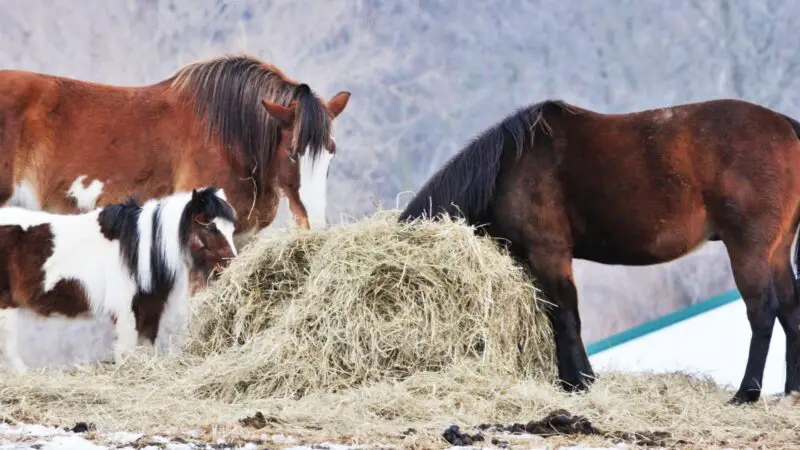
The benefits of the horse hay for the cavy are all great and all equally important. One of them is the fiber content in the hay. When cavies get enough fiber, their digestive system works perfectly.
Deficit or excess fiber is not good for them, but they know how much hay they need. With enough hay every day, limitless amounts, the cavy will have healthy digestion.
Also, another benefit is oral health. The munching of hay literally prevents the cavy’s teeth to become worn down or overgrown. So hay is not just healthy and tasty for them, but hay is good for their teeth too!
Nutrition Facts of Horse Hay
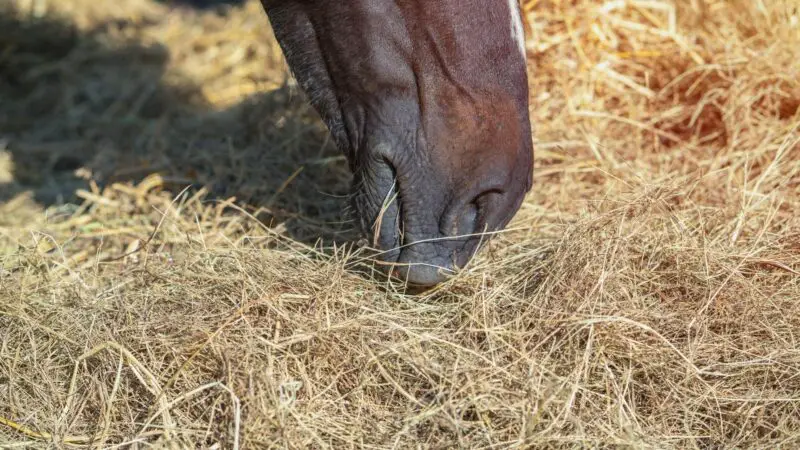
Hay, in general, is a great source of vitamins, minerals, proteins, and even fiber. There is a difference between the two main types or most used types of hay:
- Grass hay – Rich with fibers and it also contains some dry matter.
- Alfalfa – Has lots of calcium, proteins, and vitamins.
So, when someone tries to package the hay and sell it for guinea pigs, it’s understandable why alfalfa mixes are most commonly used. Mistakenly, people want to feed cavies with as many nutrients as they can. But, in this case, calcium from alfalfa is not needed for a grownup guinea pig – choose plain hay only.
There are different nutritional values for different types of hay. So, here are a few types listed, with caloric values per one pound:
- Orchard grass hay – 872 cal.
- Timothy hay – 804 cal.
- Alfalfa hay – 977 cal.
- Alfalfa pellets – 970 cal.
So, generally, the timothy hay is much better and more recommended than the alfalfa hay. The timothy hay has less calcium and phosphorus, so it’s more suitable for all grown-up guinea pigs.
And, if you want to choose other types of hay, these are good as well:
- Wheaten hay
- Oaten hay
- Paddock hay
- Pasture hay
- Ryegrass hay
- Meadow hay
Is Horse Hay Bad for Guinea Pigs? | Possible Risks
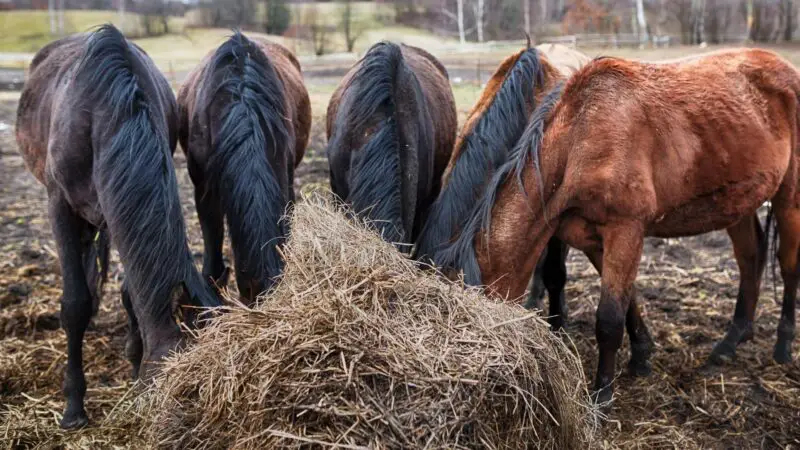
One of the risks with hay is the calcium and the amount of phosphorus. This goes mainly for the different types of hay. So, depending on which one you buy, you should see consider the calcium amounts in it.
The risk of feeding your cavy alfalfa hay is the high amount of calcium in it, so the cavy might get excess calcium deposits in the body. The calcium deposits can create bladder or in kidneys stones.
If this is not treated in time, your guinea pig can end up with kidney failure!
Above, we have mentioned that there could be mold, dust, or other weeds in the hay. These things can severely damage the guinea pig, and such foreign things can cause respiratory problems for your guinea pig.
Different Types of Hay and Their Benefits to Guinea Pigs
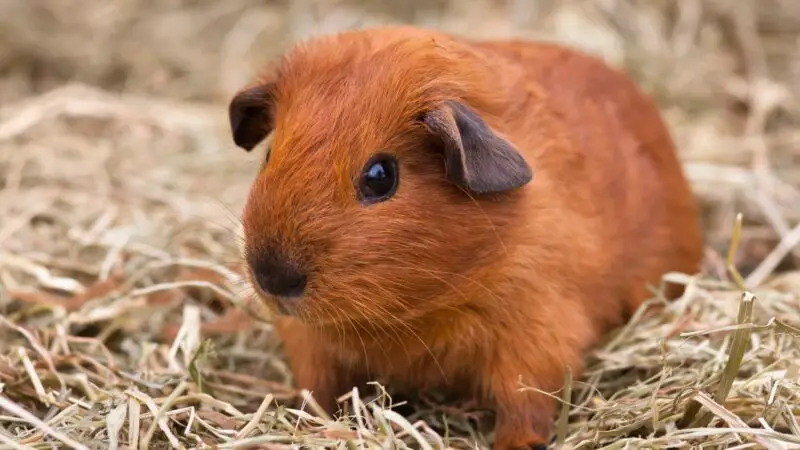
There are many different types of hay out there. One of them is alfalfa hay. This one is also named “Lucerne, “a very popular flower. Alfalfa hay is abundant in calcium, so it’s beneficial just for young cavies.
Then, there is the red clover hay. This one can be found in Europe, Northeast Asia, as well as Western Asia and i. It is also abundant in calcium.
Another hay type is the orchard grass. This one doesn’t have that much calcium and phosphorus so it is somewhat acceptable for guinea pigs to eat it. But they should not consume it very often but in moderate quantities.
The most popular is timothy hay. Timothy hay proved to be the best choice of hay for guinea pigs. It can be found in Europe and the Mediterranean region. When choosing timothy hay, it needs to be green, without a dusty or stalky appearance.
Also, we need to mention the bermuda grass (Scutch grass). This one looks greyish-green, has some rough edges and it is quite short. It also has a low amount of calcium and phosphorus, so it’s relatively safe to eat compared to other types.
Quick Facts on Horse Hay
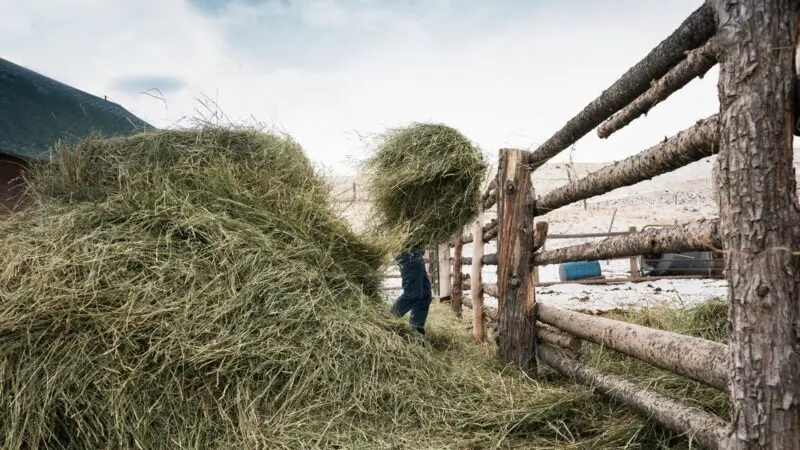
- The horse hay you buy must be fresh-green in color and with a fine texture.
- The aroma of the best horse hay is very pleasant and fresh. Musty odors indicate the presence of mold, unwanted weeds, and dust, all of which can be harmful to your pet.
- If the color of the horse hay is not bright green, the hay isn’t good.
- Most of the nutrients of hay are in the leaves, so leafy hay is ok!
- The leafy part contains the most digestible nutrients.
- For timothy hay, the first cutting is full of weeds, but the second cutting is best for guinea pigs.
- Overfeeding with alfalfa hay can result in obesity as well as other health issues.
- The timothy hay is low in proteins and high in fiber.
We have also made a full list of foods that guinea pigs can and can’t eat (150+ Types of Foods). Be sure to also check our recommended products page for everything you will ever need to assure a happy life for your guinea pigs. Hope this information was helpful and you have found the answer you were looking for.
Related: Best Hay For Guinea Pigs: A Helpful Guide
List of Sources
Vitamin C Requirements of the Guinea-Pig
Nutrient Requirements of Laboratory Animals: Fourth Revised Edition
The Effects of Diet on Anatomy, Physiology and Health in the Guinea Pig
